
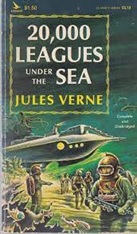 Favorite Story (1946-49) aired “20,000 Leagues Under the Sea” on Saturday, December 20, 1947 (though dates vary as it was broadcast on different days and time slots due to its being syndicated and thus aired at the discretion of individual radio stations across the country, with at least one airing occurring in 1946). The idea behind this popular show was to invite personalities of the time—authors, musicians, movie stars, sports celebrities, and others with a high profile–-to offer their favorite stories to be dramatized on radio. We’ve run a baker’s dozen of 13 since the first back in 2010, this current episode being only the 2nd since January of 2022, over three years ago, with the most recent showcased in November of last year. For newcomers to the program or to refresh the memories of those familiar with the show, a few background notes are in order.
Favorite Story (1946-49) aired “20,000 Leagues Under the Sea” on Saturday, December 20, 1947 (though dates vary as it was broadcast on different days and time slots due to its being syndicated and thus aired at the discretion of individual radio stations across the country, with at least one airing occurring in 1946). The idea behind this popular show was to invite personalities of the time—authors, musicians, movie stars, sports celebrities, and others with a high profile–-to offer their favorite stories to be dramatized on radio. We’ve run a baker’s dozen of 13 since the first back in 2010, this current episode being only the 2nd since January of 2022, over three years ago, with the most recent showcased in November of last year. For newcomers to the program or to refresh the memories of those familiar with the show, a few background notes are in order.
Before we begin with the background notes, Twenty Thousand Leagues Under the Sea was the Favorite Story choice of none other than Orson Welles (1915-1985, photo top right).
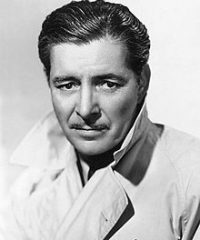
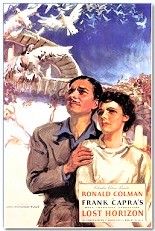 Favorite Story was hosted by the suave, debonair, early film star Ronald Colman (1891-1958), who on occasion would star in these well-produced adaptations of classic stories. Of interest to SF genre fans is Colman’s starring role in the 1937 film adaptation of James Hilton’s 1933 novel Lost Horizon. He was signed to play the lead in MGM’s forthcoming SF film Village of the Damned (1960), but died before production began. The film was picked up by a British company and starred George Sanders in the lead role. (Coincidentally, Sanders would marry Colman’s widow, Benita Hume.) Colman was nominated for three Best Actor Oscars and would win the Oscar for 1947’s A Double Life. He was honored with not one, but two stars on the Hollywood Walk of Fame, one for motion pictures and one for television. Directed by beloved film director Frank Capra, Lost Horizon co-starred a young Jane Wyatt (1910-2006) who would later be fondly remembered as Margaret Anderson as the wife of insurance salesman Jim Anderson (portrayed by Robert Young) in TV’s favorite family sitcom Father Knows Best (1954-1960). For her role as America’s favorite mother she would win consecutive Emmy Awards for Best Actress in a Comedy Series in 1958, 1959, and 1960. Wyatt would also have roles in a few dozen films over her career, probably the most notable being 1947’s Gentleman’s Agreement starring Gregory Peck, Dorothy McGuire, John Garfield, Celeste Holm, and Dean Stockwell. Appearing in numerous television shows from the 1950s to the 1980s, she is perhaps best remembered by science fiction fans as Spock’s mother in the original Star Trek TV series episode “Journey to Babel.”
Favorite Story was hosted by the suave, debonair, early film star Ronald Colman (1891-1958), who on occasion would star in these well-produced adaptations of classic stories. Of interest to SF genre fans is Colman’s starring role in the 1937 film adaptation of James Hilton’s 1933 novel Lost Horizon. He was signed to play the lead in MGM’s forthcoming SF film Village of the Damned (1960), but died before production began. The film was picked up by a British company and starred George Sanders in the lead role. (Coincidentally, Sanders would marry Colman’s widow, Benita Hume.) Colman was nominated for three Best Actor Oscars and would win the Oscar for 1947’s A Double Life. He was honored with not one, but two stars on the Hollywood Walk of Fame, one for motion pictures and one for television. Directed by beloved film director Frank Capra, Lost Horizon co-starred a young Jane Wyatt (1910-2006) who would later be fondly remembered as Margaret Anderson as the wife of insurance salesman Jim Anderson (portrayed by Robert Young) in TV’s favorite family sitcom Father Knows Best (1954-1960). For her role as America’s favorite mother she would win consecutive Emmy Awards for Best Actress in a Comedy Series in 1958, 1959, and 1960. Wyatt would also have roles in a few dozen films over her career, probably the most notable being 1947’s Gentleman’s Agreement starring Gregory Peck, Dorothy McGuire, John Garfield, Celeste Holm, and Dean Stockwell. Appearing in numerous television shows from the 1950s to the 1980s, she is perhaps best remembered by science fiction fans as Spock’s mother in the original Star Trek TV series episode “Journey to Babel.”
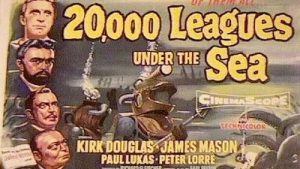
This Jules Verne science fiction adventure classic first saw print in 1869. It was serialized from March 1869 to June 1870 in the French periodical Magasin d’éducation et de récréation. The magazine’s publisher, Pierre-Jules Hetzel, then brought it out in book form in 1871 with its original title Twenty Thousand Leagues Under the Seas (notice the plural “seas” rather than the shortened later title with the singular “sea”). It was translated into English in 1872 by Reverend Lewis Page Mercier who cut almost a fourth of the book and committed hundreds of translating errors. Over more than a hundred years later the novel has seen at least a half dozen revisions (1871, 1962, 1966, 1976, 1993, 1998, 2010, and 2017) regarding the translation and restorations to Verne’s original text, including the political undertones cut by Hetzel’s and Mercier’s editions due to political sensitivities of the time. One such edition was published in 1976 by the Thomas Y. Crowel Company. It declared itself “The only completely restored and annotated edition.” But then in 1993 the same fellow who prepared the Crowel edition collaborated with a fellow Vernian historian to publish a new edition from the Navel Institute Press, again with almost exactly the same claim: “The Completely Restored and Annotated Edition.”
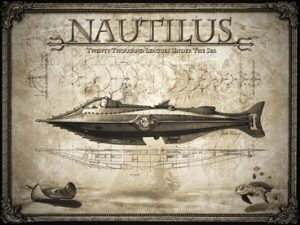
Despite the initial updates of the faulty translations and numerous editing for restorative purposes, along with the political overtones still debated from time to time, Twenty Thousand Leagues Under the Sea remains a worldwide success and arguably Verne’s best work. Captain Nemo and his futuristic submarine Nautilus have become fixtures in the consciousness of peoples and cultures worldwide. Nemo travels the oceans of the world in search for not only scientific knowledge but to escape what he believes are the evils of civilization. A terrible war caused by an unnamed, invading country has ravaged his homeland and murdered his family, and he wishes nothing more than to escape his loss by becoming a recluse, searching the seas for something he can believe in—the unwavering truth of scientific knowledge. This radio adaptation can’t begin to explore the detailed storyline of the novel but does an admirable job of portraying Nemo’s motives along with those he saves and with whom he shares several exotic undersea wonders, including visiting the ruins of the lost city of Atlantis. While not included here, one of the unimaginable dangers included in the novel and probably the most memorable is the battle with the giant squid (famously given a lengthy scene in the iconic Walt Disney film classic). The ending also follows the denouement of the novel, which is a plus. Most of us have seen the various film renditions of the story and retain fond memories of the visual experience, but few if any have had the opportunity to listen to this obviously abridged dramatization of one of the great adventure stories in all of literature, which tells the tale of a man’s total disillusionment with the surface world he has utterly forsaken, that hatred the driving force fueling his relentless search for scientific knowledge that takes him “20,000 Leagues Under the Sea.”
Play Time: 26:32
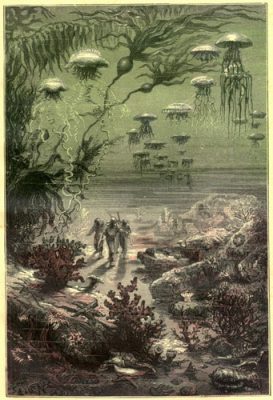
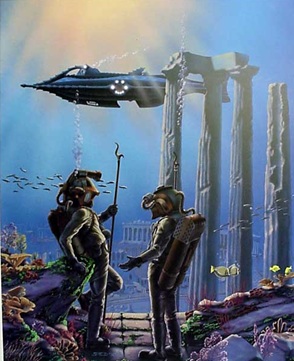
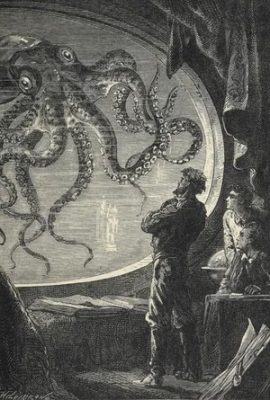
To view the entire list of weekly Old Time Radio episodes at Tangent Online, click here.